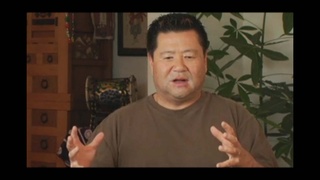Interviews
Appreciating Kinnara Taiko's approach to taiko
I was really amazed at how seriously taiko is taken. I mean it’s life-transforming. It changes your life. It’s a religion. It’s a full-blown religion and some groups have even said that. “Taiko is my religion”. That kind of shocked me. I said, “It’s just a nail keg with a skin over it. You don’t worship a taiko. Come on!” So that was kind of shocking when I first saw it, which made me appreciate Kinnara. It’s just another thing, that’s all.
That’s why I don’t like to do interviews anymore because it’s always, you know, “the father of taiko”. That’s a bit much, you know. Or “taiko masters”. What the heck is a taiko master? So it’s that kind of thing. It’s given me a real appreciation of our group here and how to try to maintain that against all odds, how to maintain that. It’s just a way of discovering how this is and, by seeing that, being well and being more open to the other people in the group.
Date: December 3, 2004
Location: California, US
Interviewer: Art Hansen, Sojin Kim
Contributed by: Watase Media Arts Center, Japanese American National Museum
Explore More Videos

Defining a Taiko player
(b.1951) Co-founder and managing director of San Jose Taiko.

Dancing in Japan as an American, in the US as Japanese
(1918-2023) Nisei Japanese kabuki dancer

Different learning style in Japan and the United States
(1918-2023) Nisei Japanese kabuki dancer

Both Japanese and American identities though Japanese dance
(1918-2023) Nisei Japanese kabuki dancer


Hardship to be a Kabuki dancer as a woman
(1918-2023) Nisei Japanese kabuki dancer

Do my best as a professional dancer
(1918-2023) Nisei Japanese kabuki dancer

Decision between becoming a minister or musician
(b. 1949) Musician and arts educator and adminstrator.

Starting Japanese American taiko their own way
(b. 1949) Musician and arts educator and adminstrator.

Japanese American taiko is not Japanese taiko
(b. 1949) Musician and arts educator and adminstrator.


Parents didn't accept me playing taiko in the beginning
(b. 1949) Musician and arts educator and adminstrator.

Performing the koto and taiko drum together, in Japan
(b. 1949) Musician and arts educator and adminstrator.

Taiko considered "Jazz" in the Philippines
(b. 1949) Musician and arts educator and adminstrator.

Tango makes him to stay in Argentina (Spanish)
(1925-2014) La Plata Hochi, Journalist
